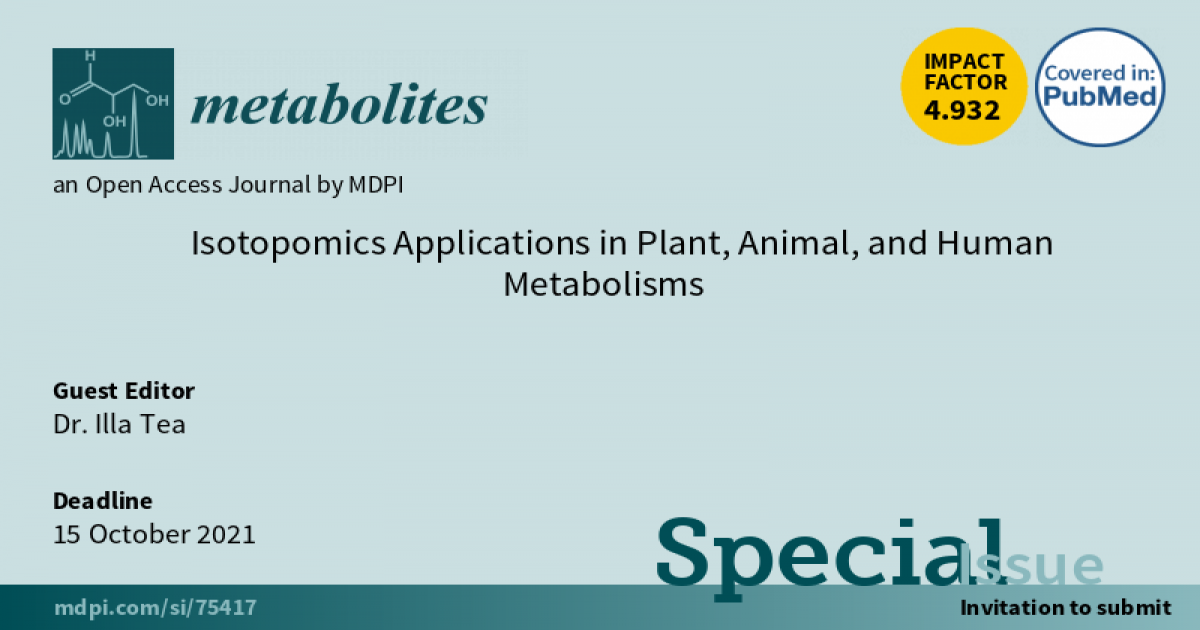Isotopomics Applications in Plant, Animal, and Human Metabolisms
A special issue of Metabolites (ISSN 2218-1989).
Deadline for manuscript submissions: closed (15 October 2021) | Viewed by 773

Special Issue Editor
Interests: stable isotopes; metabolism; cancer biomarkers; isotopomics; analytical chemistry
Special Issues, Collections and Topics in MDPI journals
Special Issue Information
Dear Colleagues,
Since the term “isotopomics” was introduced by G. Tcherkez in 2007 to describe multiple isotopic signatures within biological systems, the use of stable isotopes at natural abundance in plant, animal, and human metabolism has been more important than ever. The cornerstone of all these applications is the involvement of isotope effects, resulting from a discrimination during biochemical processes and leading to specific isotopic signatures of metabolites, or atom positions within metabolites. This Special Issue shows how the utilization of isotopomics has been successful to better understand metabolic pathways and define useful metabolic biomarkers. It includes (i) observation of isotope fractionations in a broad range of biological, biomedical, environmental, agricultural, and nutritional research fields, (ii) novel techniques for isotopomics, such as nuclear magnetic resonance (NMR), high-resolution mass spectroscopy (MS), isotope ratio MS (IRMS), and inductively coupled plasma MS (ICP-MS), and (iii) integration of isotopomics to other omics approaches (metabolomics) to disentangle metabolic pathways and bottlenecks involved in diseases or physiological responses to the environment.
Dr. Illa Tea
Guest Editor
Manuscript Submission Information
Manuscripts should be submitted online at www.mdpi.com by registering and logging in to this website. Once you are registered, click here to go to the submission form. Manuscripts can be submitted until the deadline. All submissions that pass pre-check are peer-reviewed. Accepted papers will be published continuously in the journal (as soon as accepted) and will be listed together on the special issue website. Research articles, review articles as well as short communications are invited. For planned papers, a title and short abstract (about 250 words) can be sent to the Editorial Office for assessment.
Submitted manuscripts should not have been published previously, nor be under consideration for publication elsewhere (except conference proceedings papers). All manuscripts are thoroughly refereed through a single-blind peer-review process. A guide for authors and other relevant information for submission of manuscripts is available on the Instructions for Authors page. Metabolites is an international peer-reviewed open access monthly journal published by MDPI.
Please visit the Instructions for Authors page before submitting a manuscript. The Article Processing Charge (APC) for publication in this open access journal is 2700 CHF (Swiss Francs). Submitted papers should be well formatted and use good English. Authors may use MDPI's English editing service prior to publication or during author revisions.
Keywords
- Stable isotopes
- Isotopomics
- Biomarkers
- Metabolism
Benefits of Publishing in a Special Issue
- Ease of navigation: Grouping papers by topic helps scholars navigate broad scope journals more efficiently.
- Greater discoverability: Special Issues support the reach and impact of scientific research. Articles in Special Issues are more discoverable and cited more frequently.
- Expansion of research network: Special Issues facilitate connections among authors, fostering scientific collaborations.
- External promotion: Articles in Special Issues are often promoted through the journal's social media, increasing their visibility.
- Reprint: MDPI Books provides the opportunity to republish successful Special Issues in book format, both online and in print.
Further information on MDPI's Special Issue policies can be found here.






